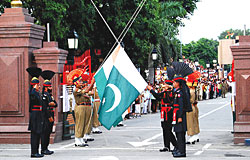 |
The massive trauma of dividing British India's Muslims from its other communities has not been assuaged. This is a subcontinent with post-traumatic stress syndrome and worse. And yes, it effects Nepal too.
For 20 years now, I've been taking stock of efforts to end hostilities between India and Pakistan, the wonderful efforts of so many fine people at all levels to bring their countries together. Now, I'm watching a thinly disguised attempt at American mediation in the name of securing their troops in Afghanistan. The most senior US diplomat, Richard Holbrooke, tries to assuage Indian sensibilities by insisting his brief is restricted to "Af-Pak" but he clearly is hoping to encourage an active peace process between New Delhi and Islamabad.
Only then, Washington reckons, will Pakistan be able to turn its attention to the existential threat within their country: the Taliban, rather than Indian forces along the frontiers.
India and Pakistan each maintain a vast standing army and spend inordinate sums on military budgets that might otherwise help build schools, roads and water lines. India maintains, rightly, that it is a regional and global player that also needs to worry about the ambitions of China. But the main focus of the Indian armed forces is Pakistan.
In Rawalpindi, the headquarters of the Pakistan Army since independence, military planners plot endless scenarios of a collapsing India that needs just another little push from a terror group here, or a militant separatist attack there.
The two countries have had each other in their sights for the better part of seven decades now and the paranoia, anger and angst of Partition drives everything.
The rawness of Pakistan's wounds were on prominent display all this month, thanks to a letter written by a retired Indian colonel, Harish Puri, and published as an Op-Ed article in the liberal English daily, The News.
Pakistani soldiers, Puri maintains, are thoroughly professional and the sight of well trained, proud men laying down arms to the Taliban in Swat is suspicious and telling. He indicts politicians and a venal, corrupt officer corps for the army's failure to subdue the Pashtun hills of Northwest Pakistan. Puri wonders if the army's top brass and its spymasters aren't themselves implicit in Taliban advances. It's something that certainly occurred to the brave, and now somewhat embattled, editor who published Puri's piece.
The outpouring of wounded, faux-patriotic drivel that has followed the letter has been something to behold. Blogs, as ever, lead the way, mostly anonymous sources of cowardly, unaccountable comment. They resound with racist anti-Hindu ranting that almost certainly came from Pakistani military sources. Letters to The News question the newspaper's nationalism and make vaguely threatening references to boycotts and worse.
Meanwhile, in civil society and human rights groups, there is a troubled sense that while Puri has got it right, Pakistanis themselves need to lead the way on taming their army, muting its deadly truck with Islamic fundamentalism and bringing it under civilian control.
The interventions of India and America do more harm than good, or so it's believed. Officially, India feels much the same about US ambitions for regional peace. For now, Washington isn't buying that.
Holbrooke travels East at least twice each month, and when he's not here, his senior colleagues from the Pentagon are doing the rounds. America is trying as hard as it ever has to heal Partition's wounds in South Asia, and is faced with barely concealed reluctance, even overt hostility, on both sides of the sub-continental divide.
History will recount only Holbrooke's success or failure, not the myriad objections and split hairs of bloggers, diplomats, letter-writers and commentators.
Daniel Lak's latest book is India Express, The Future of a New Superpower published by Penguin.



